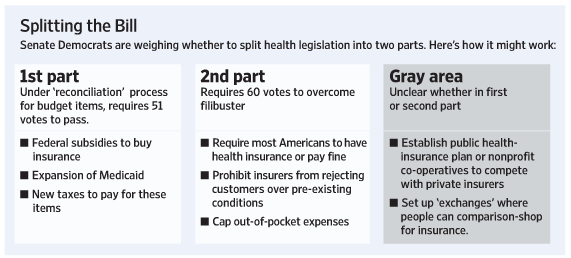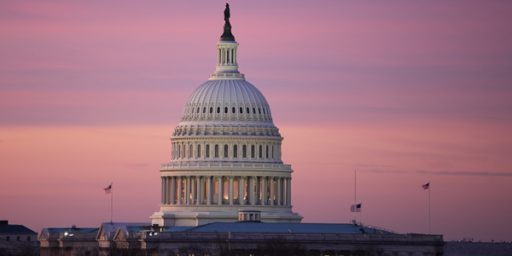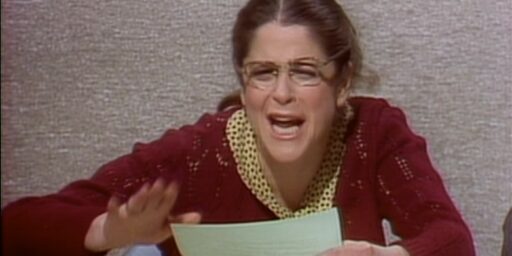Split Health Care Bill
Taking a page out of Soloman’s playbook, Congressional Democrats have a brand new plan for passing health care reform.
The White House and Senate Democratic leaders, seeing little chance of bipartisan support for their health-care overhaul, are considering a strategy shift that would break the legislation into two parts and pass the most expensive provisions solely with Democratic votes.
The idea is the latest effort by Democrats to escape the morass caused by delays in Congress, as well as voter discontent crystallized in angry town-hall meetings. Polls suggest the overhaul plans are losing public support, giving Republicans less incentive to go along.
Democrats hope a split-the-bill plan would speed up a vote and help President Barack Obama meet his goal of getting a final measure by year’s end.
Senators on the Finance Committee are pushing ahead with talks on a bipartisan bill. Democratic leaders say they hope those talks succeed but increasingly are preparing for the possibility that they do not.
Now . . . waitaminute. If the Democrats have the votes to pass the more controversial parts of the bill on their own, why would they take the heat for doing it and then give the Republicans a free pass by allowing them to vote for a pain-free bipartisan bill?
Most legislation in the Senate requires 60 votes to overcome a filibuster, but certain budget-related measures can pass with 51 votes through a parliamentary maneuver called reconciliation.
In recent days, Democratic leaders have concluded they can pack more of their health overhaul plans under this procedure, congressional aides said. They might even be able to include a public insurance plan to compete with private insurers, a key demand of the party’s liberal wing, but that remains uncertain.
Okay, but — again — if they can get these things through via a workaround, why not just keep the bill intact?







Lawmakers can’t keep the bill intact because the masses are against it. Breaking bill into parts is a way to get the people to swallow the bitter pill a little bit at a time. Don’t we all feel better now?
Obviously they think they can get to 60 for part of the bill, but only to 50-plus-Biden for the other part. Not sure what is puzzling about this. They probably can’t get the whole bill this way, but they may be able to get 90% of it, which would be better than the half a loaf they would be left with if the entire bill had to be filibuster-proof.
What did Hillary Clinton come up with this plan?
Atlantic Monthly
If the Democrats have the votes to pass the more controversial parts of the bill on their own,
They don’t. It’s true that the Dims have a theoretical “filibuster-proof majority,” but reality is somewhat different. First, there are two D senators who are not available to vote: Byrd and Kennedy. Second, there are a few D senators who are less-than-secure for re-election next year, and would prefer not to be “the vote that passed Obamacare.” Getting sixty votes for cloture is not a sure thing.
Okay, but — again — if they can get these things through via a workaround, why not just keep the bill intact?
I suspect there are two reasons:
1) they want at least a veneer of “bipartisanship” for the most controversial aspects of the plan.
2) there’s a big hurdle in the “reconciliation” method, as described by Ed Morrissey at Hot Air yesterday. Only budget bills can be subject to reconciliation — and the Dims don’t get to decide what makes something a “budget bill.” That decision is made by the Senate parliamentarian, who may or may not go along with the Dims. So the Dim leadership puts the obviously budget-related pieces into a budget bill that can be passed via reconciliation, and keeps the non-budgetary aspects — like the public option — for a second bill that has to be passed the old-fashioned way.
Maybe they don’t believe much in it themselves.
What he said. Now that taken as read I still have trouble seeing the dems be bold enough to pull off this maneuver. If they are my estimation of them (and Obama) will go up quite a lot.
My breath is not being held.
Does this strike anyone as an appropriate method to legislate in a representative democracy? You know, transparency, ethics and all that.
Split Obamacide? Who’s playing the role of King Solomon,and split the thing, Harry Read? I recommend a Dem who’s about ready to cut and run on the deal, Cleaver.
Is the filibuster an appropriate part of a representative democracy? If the Dems could just have a majority vote, they wouldn’t need to even think about playing these types of legislative games…
You mean they are bringing two bills to a vote? God the horrors.